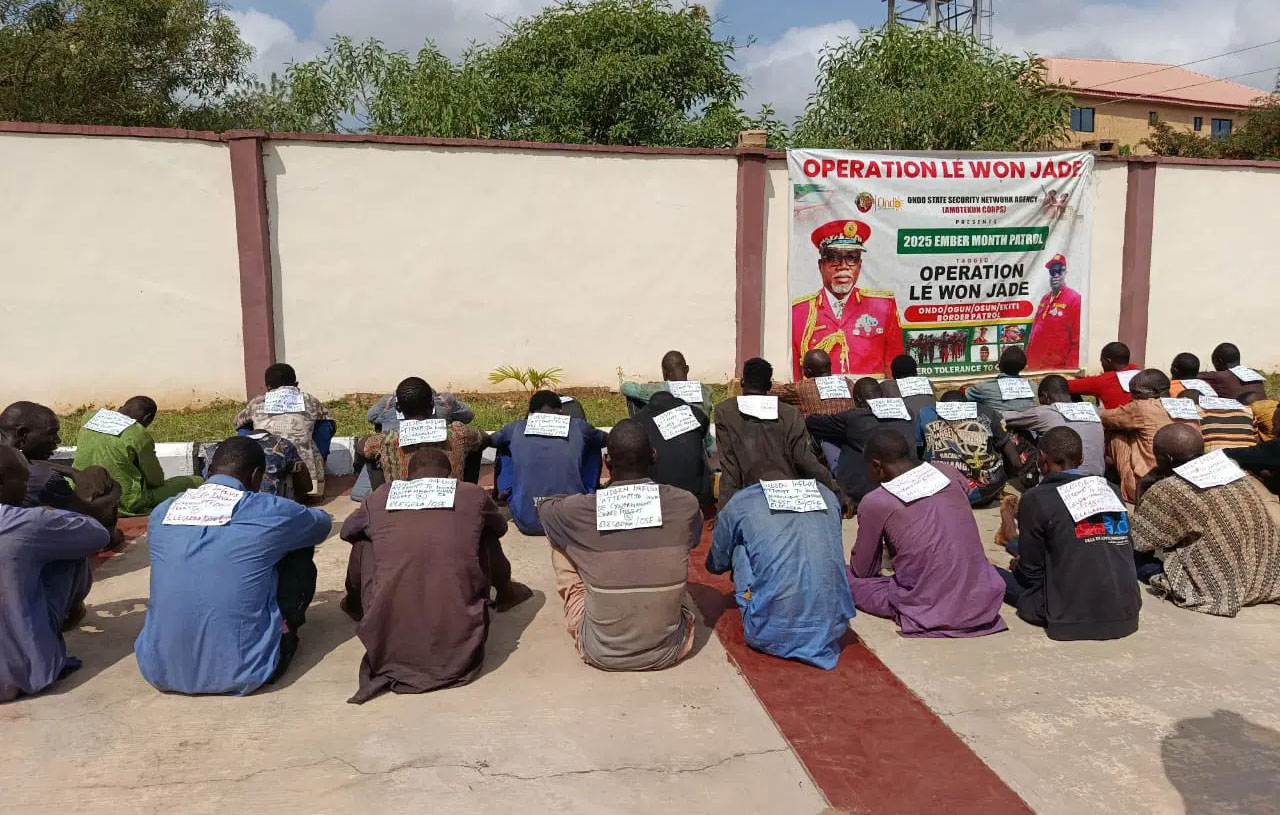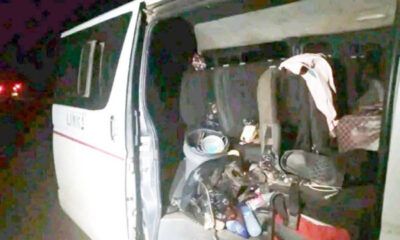metro
Concerns for Nigeria, others as ISWAP set to use drones, advanced tech in Lake Chad Basin

Concerns for Nigeria, others as ISWAP set to use drones, advanced tech in Lake Chad Basin
Islamic State West Africa Province (ISWAP) could be close to using delivery drones for attacks in the Lake Chad Basin. Weaponising and adapting unmanned aerial vehicles (UAVs) is a new trend in the group’s operational strategy, and could worsen the conflict.
Institute for Security Studies (ISS) research shows that ISWAP is already trialling delivery drones to carry improvised explosive devices. This includes assessing the weight that can be carried, how far they can go and how long they stay in the air. The threat goes beyond military targets and may impact humanitarian service delivery.
Ongoing operations by Nigeria’s military and clashes with Boko Haram faction, Jama’atu Ahlis-Sunna Lidda’Awati Wal-Jihad (JAS), have inflicted heavy losses on ISWAP and significantly reduced its space to operate. And successful intelligence-driven strikes resulting in arrests of ISWAP members outside the North-east are preventing the group from expanding. These setbacks may be forcing ISWAP to adapt its strategy, as it has done before.
So far, ISWAP’s use of drones has been limited to propaganda, surveillance and communication. ISS research, including analysis of publicly available propaganda materials and interviews with former combatants and associates, reveals an elaborate use of communication technology (see Chart 1). This includes satellite and android phones, drones, social media (Telegram and WhatsApp), high-speed printers, laptops, high-definition digital cameras, Wi-Fi, clip-on microphones, walkie-talkies, and data compression and archiving software.
READ ALSO:
- Peter Obi’s Animal Farm (I)
- Police quiz 2 student leaders over killing of 500-level OAU student
- Tinubu, Biden, Messi listed among world’s 100 most influential people
- Troops intercept 2,000 rounds of ammunition in Birnin Gwari
All these tools are used by the media team headed by Abba Yusuf (Abu Rumaisa), son of late Boko Haram founder Mohammed Yusuf. The team’s primary function is to showcase ISWAP as a successful jihadist group. That propaganda will encourage recruitment and present a positive image that cements its position as the top Islamic State affiliate globally. The media department also handles relations with other violent extremist groups, including Islamic State.
Former ISWAP members, including from the media unit, told ISS how the department functions. Staff are recruited from within the group and taught the basics of operating the equipment, mostly cameras. They accompany fighters and wait at a distance to be invited to take photos and videos, usually when things go ISWAP’s way.
The raw footage and pictures are sent to Islamic State, which produces the propaganda material. The group shares the content with ISWAP’s media team, which distributes it through a private and members-only Telegram account, Nashir News Agency (see Chart 2).
ISWAP relies heavily on high-speed satellite internet to communicate with Islamic State and other groups. Sources told ISS that ISWAP used Thuraya Wi-Fi and spent about $6,000 monthly on data. They said Lagos was the main supply source but that ISWAP encountered a problem with the supply, forcing it to switch to Chad. Although Thuraya satellite phones and internet services are illegal in Chad, they are used in secret.
A particular Thuraya model stands out as a possible device used by ISWAP. It is available in Nigeria but mainly in Lagos. The Thuraya XT-Hotspot is marketed as the ‘world’s fastest Wi-Fi via satellite for communication needs beyond GSM coverage … for quick and secure Internet connectivity in the remotest of locations.’
The sources claim ISWAP has dedicated vehicles fitted with internet services to facilitate communication and data sharing on the go. The media team uses one of these vehicles when it accompanies fighters, enabling them to immediately share material from the battlefield. This explains how ISWAP can release information quickly, including images and videos, sometimes within hours of attacks.
ISWAP’s public communication also suggests it can easily share data with Islamic State using data compression and archiving software. In addition to speed and encryption, the software reduces bandwidth costs.
READ ALSO:
- UK govt yet to apologise, Obi counters Atiku’s aide
- UK has apologised to Obi over detection, says Atiku’s aide
- BREAKING: CBN to mop up dormant accounts, unclaimed balances in banks
There is no single way to deal with the problem of ISWAP’s use of technology. The solution lies in various measures working together.
ISS research has detailed how ISWAP exploited Lake Chad Basin trade routes to get vital supplies. The group’s remote location should be an advantage for security forces who could disrupt its supply lines. Checkpoint searches have proved successful and can be used again. Those bringing in equipment and accessories should explain their destinations, which security agents should verify. Collaboration among security forces in the four affected Lake Chad Basin countries can help.
The ISS report also showed how civilian and military collaborators helped ISWAP get supplies. Security force leaders in the region must hold their personnel to the highest standards and use an independent ombudsman to deter corruption. To prevent civilians from collaborating with terror groups, authorities should work with communities and trade unions to identify and disrupt networks helping ISWAP. The criminal justice system can also play a deterrent role.
A future concern is that violent extremist groups like ISWAP become involved in cybercrime. Given Nigeria’s enormous financial powers and growing tech industry, authorities should prepare for this. Investing in technology and collaborating with tech companies to prevent their products, platforms or services from falling into ISWAP’s hands is a start.
Going after ISWAP’s money is vital. The group should be forced out of its current location using targeted and joint military operations. This would cut ISWAP’s access to its major revenue base. In using these tactics, care should be taken to avoid adversely affecting civilians, either by destroying their livelihoods or inflicting human rights violations.
Curtailing ISWAP’s access to technology will prevent it from using tech to plan and execute attacks, spread propaganda and recruit. That will reduce the damage the group inflicts on civilians and aid workers in the Lake Chad Basin.
Concerns for Nigeria, others as ISWAP set to use drones, advanced tech in Lake Chad Basin
premiumtimes
metro
Court Orders Accelerated Hearing of Suit Challenging 2025 Tax Acts, Declines Injunction

Court Orders Accelerated Hearing of Suit Challenging 2025 Tax Acts, Declines Injunction
The High Court of the Federal Capital Territory (FCT), Abuja, on Monday ordered an accelerated hearing of a suit challenging the 2025 tax acts, but declined to grant an interim injunction restraining their implementation.
The suit was filed by the Incorporated Trustees of African Initiative for Abuse Public Trustees against the Federal Republic of Nigeria and other key government officials, citing alleged discrepancies in the newly enacted tax laws and their proposed implementation date of January 1, 2026.
The respondents in the suit include the Attorney-General of the Federation, the Senate President, the Speaker of the House of Representatives, and the National Assembly.
In a motion ex parte, the plaintiff sought an interim injunction to restrain the Federal Government from implementing the tax laws pending the determination of the substantive suit. The applicant also requested an abridgment of time for the defendants to file their responses, approval for substituted service, and an order for accelerated hearing.
READ ALSO:
- Sophia Momodu Asks Fans to Stop Calling Her Davido’s Wife
- Resident Doctors Threaten Fresh Nationwide Strike Over Unimplemented MoU
- Zelenskyy Rejects Russia’s Claim of Drone Attack on Putin’s Residence, Warns of Escalation
Ruling on the application, Justice Bello Kawu, sitting as a vacation judge, granted the request for accelerated hearing and approved substituted service on the defendants.
The court ordered that the first and second defendants be served through the Office of the Attorney-General of the Federation at the Federal Ministry of Justice, Abuja, while the fourth, fifth and sixth defendants are to be served via the Office of the Clerk of the National Assembly, Three Arms Zone, Abuja.
However, the court declined to grant the interim injunction sought by the plaintiff, refusing to restrain the Federal Government and its agencies from proceeding with the implementation of the 2025 tax laws at this stage.
Justice Kawu directed that all defendants be put on notice and adjourned the matter to Wednesday, December 31, for the hearing of the motion on notice.
Court Orders Accelerated Hearing of Suit Challenging 2025 Tax Acts, Declines Injunction
metro
Amotekun Arrests 39 Suspected Terrorists Fleeing Sokoto After US Airstrikes

Amotekun Arrests 39 Suspected Terrorists Fleeing Sokoto After US Airstrikes
The Ondo State security outfit, Amotekun, has arrested 39 suspected terrorists who reportedly fled Sokoto State following the Christmas Day airstrikes conducted by the United States military in Nigeria’s North-West.
Speaking during the parade of 100 suspects across the state, Amotekun Commander Chief Adetunji Adeleye said the 39 suspects claimed to have relocated to the forests of Ondo State after fleeing the northern part of the country.
“A couple of days ago, 39 suspects were arrested, all claiming that as a result of the heat turned on them in the northern part of the country, they relocated into the forest,” Adeleye said. “We are still profiling them, and after profiling, those found with incriminating equipment and materials will be prosecuted.”
READ ALSO:
- Nigeria vs Uganda: Key Super Eagles Players Risk Suspension Ahead of AFCON Clash
- Malami, Son, Wife Remanded Over ₦Billions Money Laundering Charges
- Mrs. Regina Akume Urges SGF George Akume to Return to Christianity Amid New Marriage
The commander emphasized that anyone residing in Ondo State forest areas must obtain official permits, warning that the sudden influx of such elements raises serious security concerns.
Adeleye further revealed that synergy with neighboring state security outfits, including Ekiti, Osun, and Ogun, has led to significant arrests. Some suspects are still under investigation and were not paraded.
Regarding other suspects, Adeleye disclosed that of the 100 arrested, 61 were paraded:
- 50 for general law and order violations
- 2 for anti-open grazing offences
- 6 for kidnapping-related cases
- 3 for gender-based abuse and rape
The suspects ranged in age from 18 to 45 years. On the rape cases, Adeleye identified three suspects: 19-year-old Daniel Ojo, 33-year-old Usman, and 41-year-old Bejide, arrested in the Isinkan area of Akure, the state capital.
He commended Governor Lucky Aiyedatiwa for providing an enabling environment for security operations and thanked all state security agencies, including the police, civil defense, army, DSS, and local vigilantes, as well as the public, for their support.
Amotekun Arrests 39 Suspected Terrorists Fleeing Sokoto After US Airstrikes
metro
Malami, Son, Wife Remanded Over ₦Billions Money Laundering Charges

Malami, Son, Wife Remanded Over ₦Billions Money Laundering Charges
The Federal High Court in Abuja has ordered the remand of former Attorney-General of the Federation (AGF) and Minister of Justice, Abubakar Malami (SAN), at the Kuje Correctional Centre, pending the hearing of his bail application.
The order also applies to Malami’s co-defendants — his son, Abubakar Malami, and one of his wives, Bashir Asabe. The directive came from Justice Emeka Nwite after hearing arguments from the defense led by Joseph Daudu (SAN) and the prosecution team of the Economic and Financial Crimes Commission (EFCC), represented by Ekele Iheneacho (SAN).
READ ALSO:
- Security Operatives Seal Bagudo General Hospital After Early Morning Explosion
- Lagos Police Arrest 14 Suspected Traffic Robbers Along Lekki–Epe Expressway
- Allwell Ademola’s Death: Laide Bakare Condemns Colleagues’ TikTok Activity
Malami and his co-defendants are facing a 16-count money laundering charge. According to the EFCC, the defendants allegedly conspired to conceal, retain, and disguise the proceeds of unlawful activities totaling several billions of naira.
The charges reportedly span several years and include the use of companies and bank accounts to launder funds, the retention of cash as collateral for loans, and the acquisition of high-value properties in Abuja, Kano, and other locations. Some of the offences allegedly occurred while Malami served as Attorney-General, in violation of the Money Laundering (Prohibition) Act 2011 (as amended) and the Money Laundering (Prevention and Prohibition) Act 2022.
The defendants pleaded not guilty. While the defense urged the court to grant bail on liberal terms, the prosecution opposed it, citing the seriousness of the charges and the magnitude of the alleged financial crimes.
Legal observers describe the case as a high-profile anti-corruption trial in Nigeria, marking one of the most significant prosecutions involving a former chief law officer of the federation. The matter has been adjourned for the hearing and determination of the bail applications.
Malami, Son, Wife Remanded Over ₦Billions Money Laundering Charges
-

 Entertainment3 days ago
Entertainment3 days agoBreaking: Popular Nigerian Actress Allwell Ademola Dies at 43
-

 metro2 days ago
metro2 days agoIbadan Explosion: Fayose Releases Documents, Claims Makinde Got ₦50bn from FG
-

 metro2 days ago
metro2 days agoPlateau Kidnappers Demand ₦1.5m Each as 28 Muslim Travellers Remain in Captivity
-

 Sports1 day ago
Sports1 day agoCristiano Ronaldo Wins Best Middle East Player at 2025 Globe Soccer Awards in Dubai
-

 metro1 day ago
metro1 day agoNiger Delta Crackdown: Army Seizes ₦150m Stolen Oil, Arrests 19 Suspects
-

 Opinion2 days ago
Opinion2 days agoHow a Misleading Channels TV Headline Reignited Nigeria’s Religious Tensions
-

 Sports1 day ago
Sports1 day agoAnthony Joshua injured as two die in fatal Lagos-Ibadan Expressway crash (plus photos)
-

 metro2 days ago
metro2 days agoNigerian Army Kills 438 Boko Haram, ISWAP Terrorists in Seven Months











